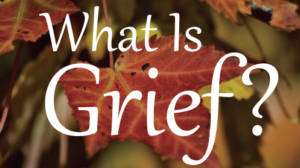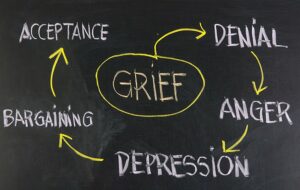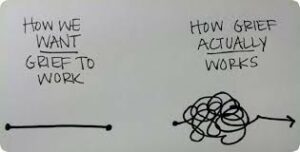Contents
What Is Grief?

Grief is the emotional response to a loss. It can be caused by the death of a loved one, the end of a relationship, or any other type of loss. Grief can be very intense and it can last for a long time.
When someone close to us dies, we go through a grieving process. This grieving process can be very difficult, and it is different for everyone. There are seven common stages of grief: denial, anger, bargaining, depression, acceptance, and hope. In this comprehensive guide, we will discuss each stage in detail and provide tips on how to deal with them.
Stages of Grief

There are seven common stages of grief: denial, anger, bargaining, depression, acceptance, and hope.
Denial
Denial is the first stage of grief. In this stage, you may feel like you are in shock or that the death did not really happen. You may refuse to believe that your loved one is gone. This is a natural way of coping with the loss at first.
Anger
The second stage of grief is anger. In this stage, you may feel angry at the person who died, at God, or at yourself. You may feel like you are not allowed to be sad or that you should have done something to prevent the death. This stage can be very difficult to deal with.
Bargaining
The third stage of grief is bargaining. In this stage, you may try to make deals with God in order to bring your loved one back. You may also try to make deals with yourself in order to avoid feeling sad. This can be a dangerous stage because it can lead to guilt and regret later on.
Depression
The fourth stage of grief is depression. In this stage, you may feel sad all the time and have trouble enjoying anything. You may also feel like you are a burden to others. This stage can be very difficult to deal with.
Acceptance
The fifth stage of grief is acceptance. In this stage, you come to terms with the death and begin to move on. You may still feel sad at times, but you are able to enjoy life again. This stage can be difficult but it is ultimately a positive step forward.
Hope
The sixth stage of grief is hope. In this stage, you begin to look ahead to the future. You may start planning for the future or looking for ways to honor your loved one’s memory. This stage offers a glimpse of hope for the future.
Guilt
The seventh stage of grief is guilt. In this stage, you may feel guilty about the things you said or did before the death. You may also feel guilty for not doing more to prevent the death. This stage can be very difficult to deal with.
Symptoms Of Different Stages Of Grief
 Each stage of grief can have different symptoms.
Each stage of grief can have different symptoms.
- Denial: In the denial stage, you may feel like you are in shock or that the death did not really happen. You may refuse to believe that your loved one is gone.
- Anger: In the anger stage, you may feel rage, bitterness, or resentment. You may feel like you are not allowed to be sad or that you should have done something to prevent the death.
- Bargaining: Bargaining can manifest as excessive guilt or trying to take on too many responsibilities. This can be a dangerous stage because it can lead to guilt and regret later on.
- Depression: Depression often manifests as sadness, fatigue, and apathy.. You may have trouble enjoying anything and feel like you are a burden to others.
- Acceptance: Acceptance may be accompanied by relief, happiness, and peace. The acceptance stage is a positive step forward. In this stage, you come to terms with the death and begin to move on. You may still feel sad at times, but you move on.
- Hope: In the hope stage, you start looking ahead to the future. You may begin planning for the future or looking for ways to honor your loved one’s memory. This stage offers a glimpse of hope for the future.
- Guilt: In the guilt stage, you may feel guilty about the things you said or did before the death. You may also feel guilty for not doing more to prevent the death. This stage
How To Deal With Stages of Grief?

Each stage of grief can be difficult to deal with. Here are some tips on how to deal with them:
Give yourself time to grieve
Do not try to rush through the stages of grief. Each stage is important and needs to be processed in its own time.
Talk about your feelings
It can be helpful to talk to someone who understands what you are going through. Talking about your feelings can help them to process more effectively.
Find ways to honor your loved one’s memory
One way to move on from grief is to find ways to honor your loved one’s memory. This can be anything from setting up a memorial fund to writing about them in a journal.
Seek professional help if you need it
If the grieving process becomes too difficult to handle on your own, it may be helpful to seek professional help. A therapist can provide guidance and support during this difficult time. If you find that you are struggling to cope with the stages of grief, it may be helpful to seek professional help. A therapist can provide guidance and support during this difficult time.
Grief is a very difficult experience, but it is important to remember that you will eventually move on from it. The seven stages of grief are just a guide – everyone experiences grief differently. There is no right or wrong way
Other Stages of Grief

There are other stages of grief that are not as common but still important to be aware of:
Anger at God
In this stage, you may feel angry at God for allowing your loved one to die. You may feel like you are not allowed to be sad or that God has abandoned you. This stage can be very difficult to deal with.
survivor’s guilt
In this stage, you may feel guilty for being alive when your loved one died. You may feel like you should have been the one who died instead. This stage can be very difficult to deal with.
Recklessness
In this stage, you may try to numb the pain of grief by engaging in risky behavior. This can include anything from drinking too much to driving recklessly. This stage can be dangerous and should be avoided if possible.
Bereavement
The final stage of grief is bereavement. In this stage, you come to terms with the death and begin to rebuild your life. This stage can be difficult but it is ultimately a positive step forward.
Shock
This is the stage where you are in disbelief over the death of your loved one. You may feel like it is all a dream and that you will soon wake up.
Anguish
In this stage, you may feel overwhelmed by the pain of grief. You may cry constantly and have trouble sleeping or eating.
In this stage, you may isolate yourself from friends and family members. You may also feel like no one understands what you are going through and that talking about your loved one is too painful.
Faith
In this stage, you may find comfort in your faith and in the belief that your loved one is now in a better place.
Misconceptions About Stages of Grief

There are a few misconceptions about the stages of grief.
Grief always follows a specific pattern
Everyone experiences grief in their own unique way. There is no one specific pattern that everyone must follow. Another misconception is that you should avoid feeling sad or “moving on” too quickly. It is okay to feel sad and to mourn your loss – it is an important part of the grieving process. And it is also okay to move on and enjoy life again.
Grief lasts for a certain amount of time
The length of grief varies from person to person. Some people may grieve for a few months while others may grieve for years. But some believe that you should be over your loss within a certain amount of time. However, this is not true – everyone grieves differently and there is no set timeline for grieving.
Grief is a sign of weakness
Grief is a natural reaction to loss and it is not a sign of weakness. And everyone experiences grief in their own way and there is no wrong or right way to do it.
Grief is a very difficult experience, but it is important to remember that you will eventually move on from it. The seven stages of grief are just a guide – everyone experiences grief differently. There is no right or wrong way to grieve.
If you find that you are struggling to cope with the stages of grief, it may be helpful to seek professional help. A therapist can provide guidance and support during this difficult time.
Coping With Different Stages Of Grief
 There are a few different treatment options available for different stages of grief:
There are a few different treatment options available for different stages of grief:
- Anger: If you are feeling angry, there are a few things that you can do to help manage the anger. You can express your anger in healthy ways, such as writing in a journal or talking to a friend. You can also try to find an outlet for the anger, such as hitting a punching bag or taking up martial arts.
- Denial: If you are in denial, it may be helpful to talk to someone who can help you accept the death of your loved one. You may also want to read about grief and loss so that you can start to understand what you are going through.
- Bargaining: If you are bargaining, it may be helpful to seek out support groups or counseling. It is also important to allow yourself time to grieve, even if it means taking a break from work or school.
- Depression: Depression can be very dangerous and should not be ignored. Therefore, if you are feeling depressed, then it is important to get professional help.
- Acceptance: If you have reached acceptance, it is important to continue moving forward with your life. However, this doesn’t mean forgetting about your loved ones. It just means finding a way to honor their memory and keeping them close to your heart.
- Survivor’s Guilt: In this stage, it may be helpful to talk to someone who understands what you are going through. A therapist can provide support and guidance during this difficult time. You may also want to read about survivors’ guilt and how others have coped with it.
- Recklessness: If you are engaging in risky behavior, it is important to get help. This behavior can be dangerous and lead to further problems down the road. There are a few different options available for treatment, such as therapy or medication.
- Bereavement: In this stage, it is important to allow yourself time to mourn your loss. You may want to talk to someone who understands what you are going through or read about bereavement. There are also support groups available that can provide guidance and support during this difficult time.
- Isolation: If you are feeling isolated, it is important to reach out for help. There are a number of resources available, such as support groups or counseling. You can also talk to your friends and family about how you’re feeling.
Moving on from grief
It is natural to want to move on from grief as quickly as possible. However, it is important to remember that the grieving process takes time. It is also okay to feel sad and to mourn your loss as it is an important part of the grieving process. And it is also okay to move on and enjoy life again. Grief lasts for a certain amount of time and the length of grief varies from person to person.
Treatment For Grief

There are a few different types of therapy that can be helpful for dealing with grief:
Individual therapy is beneficial because it allows you to talk about your loss and grief in a safe and supportive environment. The therapist will help you work through your feelings and emotions, which can be very helpful during this difficult time.
Group therapy is beneficial because it allows you to connect with other people who are also grieving the loss of a loved one. It can also be comforting to share your experiences with others who understand what you are going through.
Family therapy is beneficial because it allows family members to discuss how the death of a loved one has affected them. It can also be helpful for family members to get support from a therapist and to learn how to cope with the death of a loved one.
Medication
Medication may be helpful if you are feeling overwhelmed or depressed. As there are a few different medications that can help manage the symptoms of grief. So it is important to talk to your doctor about which medication would be best for you.
Conclusion
Grief is a difficult experience that everyone goes through in their own way. There are no right or wrong ways to grieve, and there is no set timeline for grieving. Therefore, if you find that you are struggling to cope with the stages of grief. Then it may be helpful to seek professional help. There are also different treatment options available for different stages of grief, so don’t hesitate to ask for help. Remember that you are not alone and there is support available for you.
A Word From Therapy Mantra
Your mental health — Your psychological, emotional, and social well-being — has an impact on every aspect of your life. Positive mental health essentially allows you to effectively deal with life’s everyday challenges.
At TherapyMantra, we have a team of therapists who provide affordable online therapy to assist you with issues such as depression, anxiety, stress, workplace Issues, addiction, relationship, OCD, LGBTQ, and PTSD. You can book a free therapy or download our free Android or iOS app.


